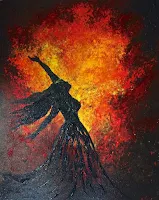Nothing keeps the spirit of India alive more than its festivities. The festivals are celebrated traditionally with rituals in different colours across the length and breadth of country. It is a process of refinement that begins with penance and contemplation of 9 nights that is celebrated as Navratri. During these nine nights, nine different forms of Shakti is invoked within by meditating upon the cosmic energy. People observe fast, celebrate Jagrans, perfom Hawans during Durga Puja to cleanse the negative impressions and tendencies that weakens our spiritual attainments. Navrati re-establishes us on the path of Dharma by bowing down to the Adi Para Shakti that holds the powers of wisdom, learning, grace, piousness, wealth, strength, peace, contentment, riches in forms of Navdurga.
In parts of India, the triumph of Adi Shakti is celebrated with accounts of epic of Ramayana by burning effigies of Ravana to accounts of Markandeya Purana that states annihilation of Mahishasura by Devi Shakti. Adi Para Shakti is worshiped in the Indian tradition as the divine feminine energy.


Vijayadashmi or Ayudhapuja popularly known as Dusshera in Indian culture is the celebration of eternal triumph of good over evil is celebrated on the 10th day. Dusshera roots from Sanskrit words Dasha which means "condition" and Hara means "to take away" It is the state of unconditioned consciousness where regeneration can take place. For example- To plant a sapling of beautiful flowers you have to extract the weed from the soil to make space for the sapling. Similarly for the ideals of dharma there needs to be an environment of penance during the period of Navratri that is observed in multitude of traditions by immersing in Bhakti and singing praises or meditating by observing fast. It create a space for one to establish itself on the grounds of Dharma and basking in the magnificence of righteousness that the Dharma champions.
When the people at the individual level will steadfast on the path of Dharma, a society will be empowered with greater ideas of fulfillment. It is important that we empower Shakti within ourselves before celebrating Vijayadashmi as triumph of Shakti. Burning effigies of Ravana won't be much of an elation if we don't refine the ill values that restrain us. Vijayadashmi is the celebration of feminine energy of the Adi Para Shakti or the cosmic energy that destroys the ignorance and its attributes. These 10 qualities originate from our primal instinct that works in compulsive tendencies, serving to our survival. It works in a low space of awareness. Vijayadashmi is the triumph of exapansion of Adi Para Shakti over these instincts and banishment of such corrupt orders that rule over us and lead to deterioration of human virtues.
1) Matsarya (Jealousy)
Jealousy is the weakness of an individual's character. It is when an individual has not realised its potential, can it be threatened by the existence of other individual. A symbol of strength is undeterred by the competition burning in its own strength and knowledge. If you compete with what's outside of you, the competition will never end and it will never be conclusive but if you wish to compete with yourself, the results can be promising. Eradicate jealousy.
2) Kama Vasana (Lust)
Kama is a sensual play of desire. It is the most joyful and stimulating experience of love. It is highly overpowering as it adds to the process of procreation and conception. Kama carries a high amount of power for our senses, it is often corrupted to suit our pleasure. Kama Vasana dominates our perpetual tendencies by influencing our actions and steering our life decisions and choices. Drive lust out of your life and regain the composure to handle your life and take charge of your actions.
3) Krodha (Anger)
This Vijayadashmi allow yourself to perceive the ability to not grant others the privileges to make you angry. Keep the endurance of your anger to yourself to make it productive. Distributing it outside, or putting it up for a show shall deduce it to a shallow play of emotions and drama. Only when a person is unperturbed it can resolve to triumph. If you can let anyone get under your skin then it won't be hard to disengage you in a battle.
4) Ahankara (Ego)
Ahankara is the endless shadow of darkness that veils the knowledge with ignorance. The most elaborate ways of keeping away Ahankara in Dharma has been equated with Karma yoga / Seva (selfless service) It is when we bind ourselves with the results of our action, we flow against the stream and make the journey of self realisation afflicting. Ahankara casts a shadow of conditioning that makes it difficult to get rid of false image that we imagine ourselves to be. One who doesn't wake up his actions of Ahankara is sure set on a path of destruction.
5) Swartha (Selfishness)
Swartha is made from two Sanskrit words Swa (own) Artha (essence, goal) A selfish person lives in the confines of his own misery and never experiences anything exemplary out of his experience. For a whole lot of people the universe is centered around them, they don't want to be disturbed by the anything that involves anything vaguely out of their comfort zone or a place where they are celebrated. This quality gives birth to the alter ego that masks the Swartha from the outer world as it lives inside us as demon mulling into a mire of its own making. Get rid of Swartha and re-discover your potential.
6) Moha (Attachment)
Moha is the false sense of attachment to the transient vanities that gives us a sense of pleasure. It is attachment that bonds us to suffering. Attachment brings in the set of social conditioning that creates a rift in our perception which gives us a distorted view of reality. It takes knowledge of self to realise the value of person without getting entangled in social constructs and divides that blinds us of the higher knowledge.
Namaste.
7) Amanavta (Cruelty)
It takes enormous courage for the men of great conscience to stand against the protocols dictated by the rich and powerful to enjoy power and subservience of people. Cruelty towards others is a cruelty towards ourselves. It takes away our empathetic abilities and strength of compassion. Dharma propagates message of acceptance and tolerance. Cruelty is short lived, it is glory of righteousness that is eternal.
8) Anyaaya (Injustice)
To ignore the acts of injustice is to become accomplice in it. It is the dharma of every person to raise the voice against the injustice. It is not easy to fight Adharma since it appears as immaculate as Dharma but in reality it is structured on a weak foundation of lies and corruption that is supported by the injustice pertaining in a society. It is for the men of righteousness to conquer the forces that give rise to injustice.
9) Lobha (Greed)
One of the top reasons why the world is suffering with inequality is because of the desire to acquire more than what's necessary. The imbalance in the material possession of the world has had catastrophic effects on people leading to exploitation of resources and humanity. While greed may have brought all the material comforts in the life of greedy. They have never rejoiced in eternal peace and contentment of their being.
10) Mada (Arrogance)
More than it helps us to keep pushing foward, arrogance makes us stagnant in our growth. Arrogance is another barrier to our potential that in its best takes us closer to the victory but doesn't allow us to take the winning steps. In an attempt to consolidate ourselves, we weaken our position by compromising our strengths to our arrogance. It becomes important to not let arrogance get around us. Check yourself, before you wreck yourself.














Comments
Post a Comment